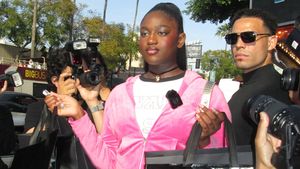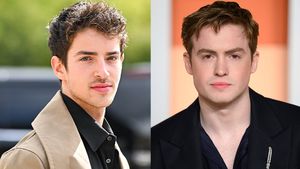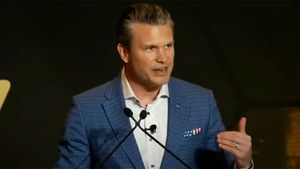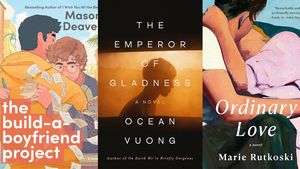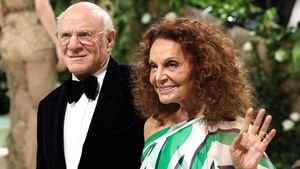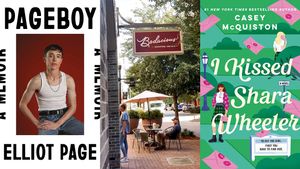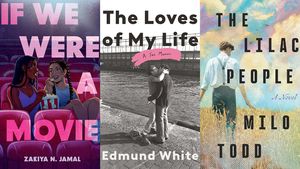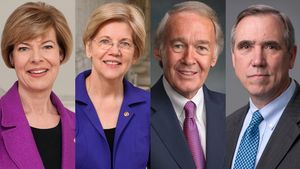She is not a victim. Don’t call her one and don’t even think about it to yourself as you’re sitting in a quiet room. She is a wife, partner, friend, co-worker, gay rights activist, wine-lover, and humble spirit. Charlene Strong, age 47, also happens to be a lesbian. Her very private and devastating story made national headline news in 2006 when a flash flood plummeted into Seattle, Washington’s Madison Valley. The effects of the storm killed her wife of nine years, Kate Fleming. In an instant, Strong was thrust into the media spotlight as an activist and film subject depicted in the monumental award-winning Trick Dog Films documentary For My Wife.
Strong was denied access to visit with her wife as she lay dying at Harborview Medical Center in Seattle. She was told more than one time that Fleming’s next of kin needed to be contacted and that she was not adequate enough to fill that role. It wasn’t until an out-of-state relative called the hospital to approve Strong’s presence that she was finally allowed to spend a few precious moments with her wife before her inevitable death. When it was time to finalize funeral arrangements for Fleming, Strong was denied the right to make those very important decisions. They were more than happy to take her money, though.
Gay marriage is not yet legal in Washington State. At the time of Fleming’s death, Governor Christina Gregoire had not yet signed into law the Domestic Partnership Registry. Would things have turned out differently for Strong if the law had already been enacted? Possibly. She would have had at least a wallet card to show the hospital workers to prove her relationship to Ms. Fleming. Had the flood happened in another state other than Washington, the card would have meant absolutely nothing. It would’ve been a bookmark.
The world watched as your partner of nine years, Kate Fleming, drowned in your Seattle basement during an unthinkably horrific flash flood in 2006. You were suddenly thrust into the spotlight in the fight for gay rights when you were denied the right to visit with Ms. Fleming while she lay dying in the hospital. How did you make the decision to stand up and fight versus give into the depression of the situation?
I truly believe that no one in a situation like what Kate and I struggled with thinks at that moment, “I am going to fix this injustice”. I love deeply and that is what motivated me. When I was told that I was not [Kate’s] next of kin not once, but twice, I would be lying if I said that it didn’t stir something in me. It was not until I was able to sit quiet and feel the impact of what was happening that I realized I had to say something. Believing that somehow I had to right the wrongs of what went wrong the night Kate died and the days to follow have forever changed my world.
More on next page...
\\\
(continued)
Feeling sorry for myself is not my style, nor has it ever been. I have never liked the word “victim”, and I am not comfortable when someone tries to categorize my experience as “I was a victim”. I guess I’m just hard-headed, but I refuse to give into the dark moments. Trust me, I have had those moments, but that is not who I will ever be. Those who I love know my heart and have thankfully held me up and they continually remind me to live and love again.
You made a documentary film titled For My Wife to recount the tragic events leading up to Kate’s death at Harborview Medical Center in Seattle, WA. How were you approached to make a documentary film regarding your hospital tragedy?
Let me be very clear, I did not make a film. I agreed to be filmed. I allowed my life to be documented. Trick Dog Films (also known as my dear friends David Rothmiller and LD Thompson) and I had a chance meeting when they were at a dinner I was attending. It was one of those moments of connection and a friendship grew from that night. It was a good thing because we have been dealing with [an ongoing] story that has not always been easy. I feel strongly that if it had not been for them I would never have agreed to a film. David said to me, “Activists have always been our heroes and your story needs to be told”. Thus began the journey. The first filming was of me standing by Governor Gregoire at the signing of the bill.
Was there ever a time during the filming process of For My Wife when you wanted to say, “Cut!” and shut the whole production down? What kept you moving forward with the project?
Yes, I had thoughts of stopping the filming, but it mostly came from outside distractions. The three of us had a very clear way of dealing with those moments and with how hard it was sometimes. We laugh a lot and we do it often; sometimes I think to soften ourselves to the rigors of trying to do a film about such a sad event. It is a ton of work making a film and I am very proud to say that we are doing great. I am very proud of the work they did to make such an amazing documentary.
Film screenings of For My Wife have popped up all over the country and your very personal project has won multiple awards to date. In your opening remarks before the screenings, you say that you want attendees to feel as though they are sitting in your living room viewing the film. Is it difficult to attend the screenings and relive the events?
When the film is shown, I do not sit in the room and watch it any longer. Over time it has become increasingly difficult [to watch]. If I do watch the film, I am pretty much unable to do a Q&A after. So, to protect myself and be more present at the Q&A, I take a walk and come back [when the film is done]. I think it also gives the audience space to feel what they want and not what I must be thinking.
One of your favorite sayings to viewers of the film is “Be a light, be a flame, be a beacon.” Can you tell us why you choose this signature to share and inspire others?
It was what Kate would say to herself just before she would go on the stage to act. She was an amazing actress and, strangely, I did not learn of the saying until after her death. Kate was a very private person who was so dang smart and insightful. Hearing that quote made me wonder if she was saving it for me as a way to help me. She always talked about her North Star (her guiding principle). I think this [quote] was her guiding principle and I have now made it mine. I don’t think she minds.
More on next page...
\\\
(continued)
CinemaLibre recently released For My Wife to the masses. Why is it so important for people to purchase this film and share its message and content with others?
For my Wife at its heart is a love story and who cannot understand that? I have heard from well-meaning folks in the LGBT equality movement that only stories from where they live will motivate and move voters; I have actually been told this before! I believe this… I am an American and this story is an American story that has relevance throughout this nation. Keeping our stories to ourselves is not going to educate anyone. For My Wife approaches the tough subject of inequality and the collateral damage of what happens without legal protection for our community. The filmmakers had many options and they chose to tell Kate and my story with grace and that is what will soften people and I am seeing it happen when people see this film. It makes [the subject] approachable and allows people to ask questions of what they thought their beliefs were and challenge them. As another curly headed woman coined it, the “ah ha” moment.
Would you have considered yourself a gay rights activist before the aforementioned unfortunate event in 2006?
No, I would not have considered myself a gay rights activist. I have always believed in standing up when something was not right. I volunteered for the Humane Society for an organization that helped people affected both physically and finically by HIV/AIDS. We understood how many people felt abandoned with their illness and their dog or cat was often their best friend and we wanted to keep their friends healthy. Kate was one of my volunteers at the clinic I designed. We became fast friends and I believe it was where I first kissed her. We were cleaning up after the clinic and it was such a nice surprise. It wasn’t the last kiss either.
There was likely not one person in Seattle who did not hear of Kate’s drowning. It was an awful storm the likes of which we had never seen. Add to it the freaky way she died, the fact that it was National News, and that Kate was a renowned audio book star. Kate had narrated over 250 audio books.
In January 2007, you stood up to testify before the Washington State Senate in support of a bill creating a statewide Domestic Partnership Registry. How much of an impact do you feel was made by your presence at the hearing?
When I decided to testify, it was news among the community, but it never crossed my mind that I was going to fail. I was so focused on what I was going to say that it did not occur to me that legislators would not understand. I just did what felt right.
Can you recall one of the most memorable things that occurred during the hearing and why it still holds a spot in your memory three years later?
One memory I have from the second time I testified was sitting at the hearing and a man representing the Bishop of Seattle saying horrible things about gay and lesbian people. I waited until he left the room and then followed him down the hall. I was shaking inside, but somehow I did not yell at him. I calmly told him that I was Catholic and that it was my faith that kept me from losing my mind. I was crying and then he started crying and I asked him to think about the lives he was speaking about. I told him that he did not know my life or Kate’s, but that we had shared a faith. It was a faith I did not always believe was right but, nonetheless, it was ours and we deserved to be respected.
Governor Christine Gregoire asked you to accompany her as she signed the domestic partnership bill into Washington State law in April 2007. Did you feel that you had support outside of the public arena from the Governor? How has she aided your quest for equality in Washington State and beyond?
Your term on the Washington State Human Rights Commission expires in 2012. Do you have any plans for a national office seat following your term?
2012 is a ways off so I will stay focused on today. No, I don’t have an answer regarding if I will ever run for office. Perhaps staying a free agent is best for now.
More on next page...
\\\
(continued)
What can we all do to stay active, motivated and in-charge of our destiny as LGBT folk?
Never get complacent; it’s our worst enemy. I cannot stress this enough. If we don’t find our passion for our rights we will never see full equality. So things are better, right? We can be out in many places, I see folks holding hands, etc. but that’s not every gay and lesbian person’s reality. See, it’s not just about your life - its’ about all of our lives. Civil rights many never be denied to you personally, or shall I say, you may not feel the direct force of discrimination in your life. I have and it is humiliating. To be stripped of your humanity is indescribable. I am not alone in this feeling and it is our responsibility [as a community]. I often say that if we are not willing to fight for our own rights then why should anyone else? The simplest of things one can do is to vote. It may [just] be considered a right, but in my mind it is one of the most powerful tools.
You have recently re-married. Can you tell us a little bit about your life now post-tragedy?
Yes, it is true. I have remarried and all I can say is… she is my soft place to fall. She holds me when I hurt, she loves me when I’m a mess and she stands by me when I am out there traveling all over. She is a blessing; I just hope I am half the woman she is because putting up with me is no easy task.
Where can LGBT people in the nation look for the most current rights afforded to them under law? It changes so frequently and many of us lose track of our progress as a community still fighting for equality.
Our rights are often looked at on a state level. I want to propose this idea. If our country has taken the steps to have a federal policy called DOMA, would it not make sense then that our rights need to be looked at on a national level? DOMA is 14 years old. It defends no one. It is one of the most discriminatory policies of this country. I am, as I said before, an American and I am entitled to all of the rights and provisions afforded to every other American. Except that I’m not. If I want to exercise my right to marry, which as it stands I cannot in Washington and most other states in our country, I lose out on 1138 rights. How is it then that I am expected to pay taxes and be a contributing part of society when I am gay and not afforded all of my rights? Think about what that means. When we hear that a state is allowing rights to gay and lesbian couples, those rights mean nothing when we leave that state. It does not even address the lack of federal rights we are denied.
To lighten things up a bit, please tell us your favorite…..
Okay, I feel like I’m on the Dating Game!
Favorite Film – My favorite movie isCool Hand Luke. I love that movie.
Favorite Musician – My favorite singer and musician isAlison Krauss
Place to Travel – I love Italy. Florence made me cry because I was so happy there.
Books – I read magazines and newspapers mostly.
Quotes – “Be a light, be a flame be a beacon.”
Wines – Oh I love me some good wine. I am a fan of Cabernet. My wife and I collect wine to the point that our friends make fun of us. We love wine, entertaining and cooking with friends. St. Germaine is devilishly good. I have sworn off it because it makes me hang from the rafters. Try it with gin and a twist of lemon, very cold. Need I say more?
All photos courtesy of Trick Dog Films.
Get more from Sarah here!
Follow SheWired on Twitter!
Follow SheWired on Facebook!
Be SheWired's Friend on MySpace!

























































































